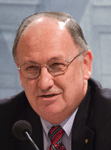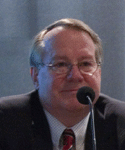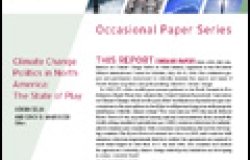Climate Change: Historical Perspectives and the Current Debate
Weather and climate experts offer a historical perspective on the current climate change debate.
Overview
Efforts to address global warming should be conducted with a thorough knowledge of climate history, maintains James Fleming, professor of science, technology, and society at Colby College, and current Wilson Center public policy scholar. Weather and climate experts Roger Launius and Michael MacCraken joined Fleming on December 11, 2006, to offer a historical perspective on the current climate change debate. During the event, sponsored by the Environmental Change and Security Program, the speakers drew on information and arguments presented in Fleming's new books, The Callendar Effect: The Life and Work of Guy Stewart Callendar and Intimate Universality: Local and Global Themes in the History of Weather and Climate. The books, according to Fleming, look back at efforts to understand human interactions with weather and climate, and also provide a useful foundation for addressing the challenges posed by global warming.
The Legacy of Guy Stewart Callendar
In 1938, British engineer and scientist Guy Callendar began research that would lead him to identify the links between the burning of fossil fuels and climate change. By compiling weather data from around the world, Callendar discovered that global warming could be induced by increases in the concentration of atmospheric carbon dioxide. His theory is known as the "Callendar effect."
 Yet until recently, Callendar's contribution to climatology was largely overlooked by historians and scientists. "His scientific papers, though very valuable, were in danger of being scattered, damaged, and lost," said Fleming. By collecting Callendar's previously unpublished scientific correspondence, notebooks, family letters, and photographs, Fleming was able to chronicle the climatologist's life and groundbreaking research, which continues to influence scientists today. Launius, chair of the division of space history at the National Air and Space Museum, credited Fleming with "rescuing Callendar from obscurity," arguing that the biography provides a more comprehensive and complete history of early climate change research than was previously available.
Yet until recently, Callendar's contribution to climatology was largely overlooked by historians and scientists. "His scientific papers, though very valuable, were in danger of being scattered, damaged, and lost," said Fleming. By collecting Callendar's previously unpublished scientific correspondence, notebooks, family letters, and photographs, Fleming was able to chronicle the climatologist's life and groundbreaking research, which continues to influence scientists today. Launius, chair of the division of space history at the National Air and Space Museum, credited Fleming with "rescuing Callendar from obscurity," arguing that the biography provides a more comprehensive and complete history of early climate change research than was previously available.
Exploring the History of Climate and Weather
The eight essays in Intimate Universality: Local and Global Themes in the History of Weather and Climate span 300 years of meteorological history. Fleming, who co-edited the book and contributed a chapter, said the collection illuminates the ways in which history can serve as both a tool and an artifact of modernity. The book tracks past attempts to understand, predict, and even control climate and weather. "It serves to stimulate other explorations in fields of science and technology by juxtaposing the intimate, the local, and the global," said Fleming. Launius observed that in addition to underscoring the urgent need to curtail current levels of pollution, Intimate Universality raises important questions about the potential implications of proposals to counteract the effects of global warming by "engineering" the climate.
 Together, The Callendar Effect and Intimate Universality "make an important contribution to our understanding of weather and climate," and serve as benchmarks in the historiography of meteorology and climate change, said Launius. The Climate Institute's MacCracken agreed, praising Fleming for helping provide a foundation for scholars seeking to construct more comprehensive climate assessments. He called for immediate political action to address global warming, but cautioned that any strategy to address climate change must go beyond simply reducing carbon dioxide emissions and include a comprehensive plan to address deforestation and ocean acidification: "[W]arming isn't the only important issue."
Together, The Callendar Effect and Intimate Universality "make an important contribution to our understanding of weather and climate," and serve as benchmarks in the historiography of meteorology and climate change, said Launius. The Climate Institute's MacCracken agreed, praising Fleming for helping provide a foundation for scholars seeking to construct more comprehensive climate assessments. He called for immediate political action to address global warming, but cautioned that any strategy to address climate change must go beyond simply reducing carbon dioxide emissions and include a comprehensive plan to address deforestation and ocean acidification: "[W]arming isn't the only important issue."
Drafted by Ken Crist.
Speakers
Hosted By

Environmental Change and Security Program
The Environmental Change and Security Program (ECSP) explores the connections between environmental change, health, and population dynamics and their links to conflict, human insecurity, and foreign policy. Read more
Thank you for your interest in this event. Please send any feedback or questions to our Events staff.








